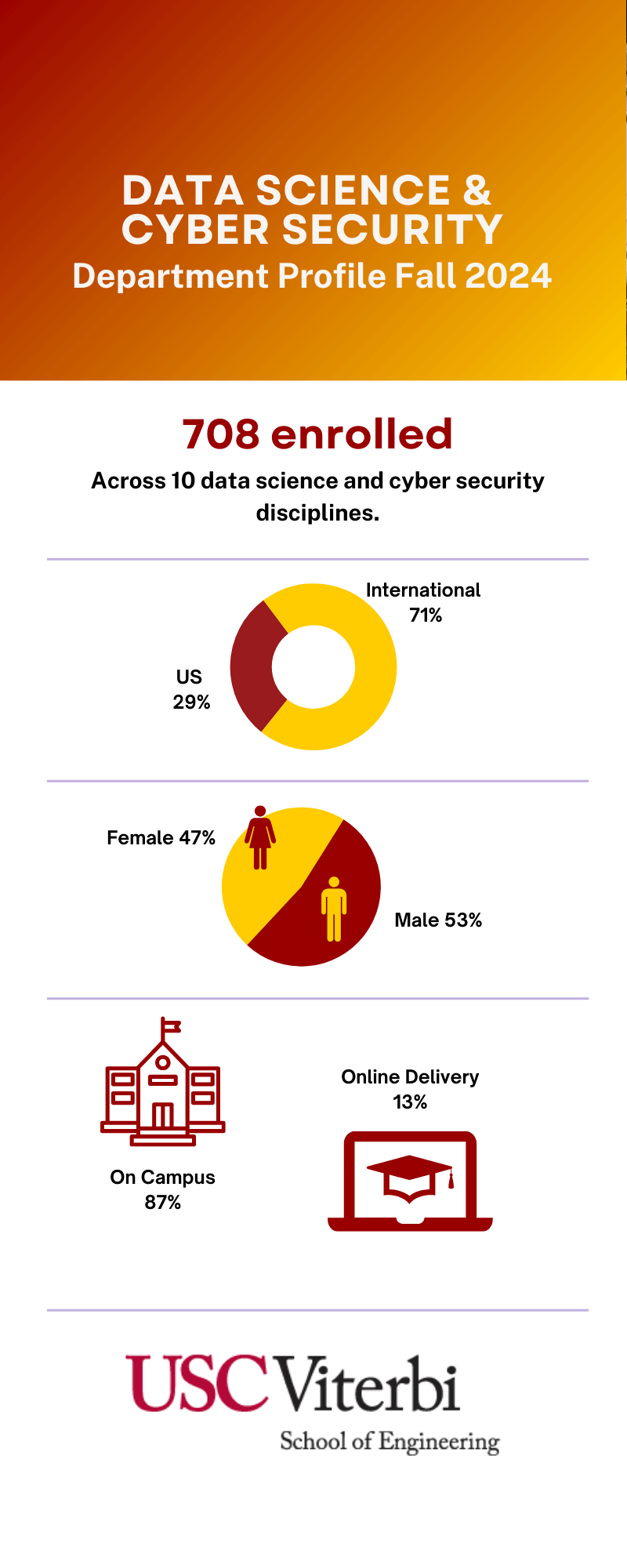The Master of Science in Healthcare Data Science is a cross-disciplinary joint degree program offered by the Keck School of Medicine and the Viterbi School of Engineering.
Data science for addressing healthcare needs is an increasingly important area for creating novel devices, advancing biomedical research, and developing innovative processes that require integrative approaches linking data systems, analytics, business processes and decision support. Large amounts of health data are becoming available across all components of the healthcare ecosystem - big data is becoming the norm. Advances in data acquisition, storage, processing and interpretation are blurring the boundaries between traditional health care provision and into mobile devices and the Internet of Things. As more personal health data are collected, there are more opportunities for disease prevention and monitoring. As life expectancy grows, there is increasing demand for devices and services that support independence and quality of life. From health organizations to startups, there is unprecedented demand for healthcare data science professionals with clinically-grounded experience relevant to current health system needs.
The USC Master of Science in Healthcare Data Science will provide students with the knowledge and skills to:
- Understand the requirements and techniques to manage health and healthcare process data collected by healthcare providers and organizations, use it to improve patient care, and analyze it to improve the business processes in and between hospitals, insurance companies, public health agencies, and other components of the healthcare ecosystem
- Understand the use of data science in clinical research and translational medicine
- Understand the design and development of personal devices and mobile apps to collect health data and to monitor health-related variables
- Understand the use of emerging technologies in data science and their application to health and healthcare delivery processes
- Gain direct experiences in finding and articulating challenges in healthcare settings that can be met through integrative engineering solutions
Upon graduation, students will have not only data science skills but will be uniquely qualified to join and lead data science teams at health companies and healthcare provider organizations, perform data analytics in health-related startups and tech companies, and develop emerging technologies revolving around health data.
The degree consists of a set of required core courses in both data science and healthcare supplemented by electives chosen from more focused courses in data science and health. On the data science side, students will learn about artificial intelligence (particularly machine learning and semantic data models), data management, privacy, and data visualization. On the health side, students will be integrated into teams working with medical students in healthcare settings. Capstone, real-world projects will motivate elective choices and enable students to acquire practical experience with a data science project based in a healthcare service setting.
The curriculum is designed to be accessible to students with any background, including students with a biomedical background and no computer science knowledge as well as students with a computer science background and no biomedical knowledge. Students with undergraduate degrees in computer science, engineering, science or mathematics will acquire the necessary knowledge to analyze health data with diverse sources and purposes, and can request to replace introductory data science courses with more advanced ones. Students with undergraduate degrees in biology, biochemistry, and other sciences will acquire formal and practical data science skills, and can request to substitute introductory courses in health with more advanced ones.
International Students: This program is eligible for the OPT STEM extension.
- This program requires completion of 32 units of coursework
- Thesis option not available. Directed Research (research without thesis) may be requested after completing first semester
- USC Catalogue
- USC Schedule of Classes
APPLICATION DEADLINES
| SEMESTER | DEADLINE |
| Fall | December 15 (Scholarship consideration)
January 15 (Final deadline) |
Visit our Ready to Apply page for more information.
ELIGIBILITY CRITERIA
Applicants to the Master of Science program in Healthcare Data Science must have a bachelor’s degree or be in the process of completing a bachelor's degree. Most applicants have degrees in engineering or closely related fields, such as Computer Science, Economics, Hard Science, and Mathematics.
Applicants without a bachelor's degree in a directly related field may still be considered if they have completed and demonstrated strong proficiency in the following coursework (or equivalent):
This is not an exhaustive list. Applications are reviewed holistically; simply taking these courses does not guarantee admission.
APPLICATION REQUIREMENTS
The following materials are required to be included with your online application:
- Transcripts
- Resume/CV
- Personal Statement
- Letter of Recommendation (2 highly recommended)
NOTE: The GRE is not required for 2026 applications
The following link will take you to an overview of the tuition & fees for graduate engineering students, including payment information. Both on-campus and DEN@Viterbi students pay the same tuition
TUITION AND FEES OVERVIEW
Use the link below to download the Cost of Attendance to see a summary of tuition and fees by semester. The document is a typical example and the number of courses, and time to complete the program, will vary by student.
Estimated Cost of Attendance - 32 Unit Program
 JAE LEE
JAE LEE
What were the main reasons you chose to pursue this graduate program at USC?
Coming from a non-engineering and a non-computer science background, I needed for my graduate program to be rigorous but at the same extensive to help me learn all the necessary knowledge and skills to become a data scientist in the healthcare industry. I find USC Viterbi, School of Engineering, is exactly that program. The interdisciplinary data science programs, like Healthcare Data Science, was carefully designed to teach and train data science skills relevant to their respective domains. Additionally, what better school than one of the top-ranking engineering schools of the country.
Tell us about an exciting and unforgettable experience from your two years at USC.
Not to sound cliché, but all my courses and professors have been unforgettable. The relationships I have built with my professors and knowledge I have acquired from them is one the greatest gifts from USC. Learning from experts of their crafts and connecting with them beyond the classroom made attending their classes much more exciting.
What are some personal achievements or experiences you’d like to share?
One of my personal achievements was overcoming imposter syndrome. Being surrounded by classmates with much more extensive engineering and coding knowledge, I often left alienated from the rest of the class. But, through the welcoming classroom environment, detailed explanations of concepts from my professors I struggled to grasp, and the additional instructions of the TA's, I now feel as ready and knowledgeable as my peers.
Which organizations/activities have you been involved with outside of the classroom?
I have been involved in clinical research in ophthalmology with researcher physicians at the Roski Eye institute and participated on Datafest organized by USC CKIDS (Center for Knowledge-Powered Interdisciplinary Data Science). I highly recommend in participating in Datafest as well as any of the many data science projects available.
What is one characteristic or quality about yourself that would surprise others?
I am fluent in Spanish. It never fails to surprise people when I order tacos in flawless Spanish.
What advice would you give future Viterbi students?
Aim high, experiment, and reach out first.
Alumni Employment*
Companies & Job Titles (multiple positions may be listed)
- Amazon - Business Intelligence Engineer II
- BeiGene - Senior Associate
- Center for Disease Control & Prevention - Data Scientist
- Information Sciences Institute - Directed Research
- Jiaherb, Inc. - Sales Assistant / Technical Document Specialist
Additional career outcomes information can be found on our MS in Applied Data Science pages.
.Internships (Summer 2023)**
Fresenius Medical Care
.
.
* Information is based on voluntary surveys and should not be interpreted as a comprehensive view of program alumni.
** Internship data is from CPT internships done by our international student population.
This program is also available online to professional engineers through DEN@Viterbi. Because the DEN@Viterbi program provides a fully equivalent academic experience, the degree a USC engineering student earns is the same whether they are on-campus or online.
If you are interested in beginning classes as a DEN@Viterbi student next semester, explore the requirements and steps to enrolling as a Limited Status Student.
Learn More About DEN@Viterbi
Detailed Program Curriculum and RequirementsSchedule of Classes
DEN@VITERBI ONLINE COURSE OFFERINGS
The following courses and program requirements serve as program planning for DEN@Viterbi students. Course offerings and availability are subject to change. Please consult with advisor if you have any questions.
Core Courses
|
| All Courses Required - 20 units total. |
| BME 527 | Integration of Medical Imaging Systems (4 Units) |
| BME 528 | Medical Diagnostics, Therapeutics and Informatics Applications (4 Units) |
| DSCI 510 | Principles of Programming for Data Science (4 units) |
| DSCI 549 | Introduction to Computational Thinking and Data Science (4 units) |
| DSCI 550 | Data Science at Scale (4 units) |
Elective Courses
|
| Students must take one course from the Data Science electives and one from the Health Science electives and the remaining units can be chosen from either group. Total number of program units must be at least 32. |
| Data Science Electives |
| Choose at least one course from the following. |
| CSCI 530 | Security Systems (4 Units) |
| CSCI 570 | Analysis of Algorithms (4 units) |
| CSCI 571 | Web Technologies (4 units) |
| DSCI 529 | Security and Privacy (4 Units) |
| DSCI 551 | Foundations of Data Management (4 Units) |
| DSCI 552 | Machine Learning for Data Science (4 Units) |
| DSCI 553 | Foundations and Applications of Data Mining (4 Units) |
| DSCI 554 | Data Visualization (4 Units) |
| Health Science Electives |
| Choose at least one course from the following. |
| BME 525 | Advanced Biomedical Imaging (4 Units) |
| PM 504 | Quality in Health Care (4 units) - offered by the Preventive Medicine department. |
| PM 508 | Health Service Delivery in the U.S. (4 units) - offered by the Preventive Medicine department. |
| Additional Notes |
|
Students with a computer science background will have the option of replacing DSCI 510, DSCI 549, and DSCI 550 with DSCI 551, DSCI 552, and DSCI 553. As a result, they will be able to take additional data science elective courses.
|



 JAE LEE
JAE LEE